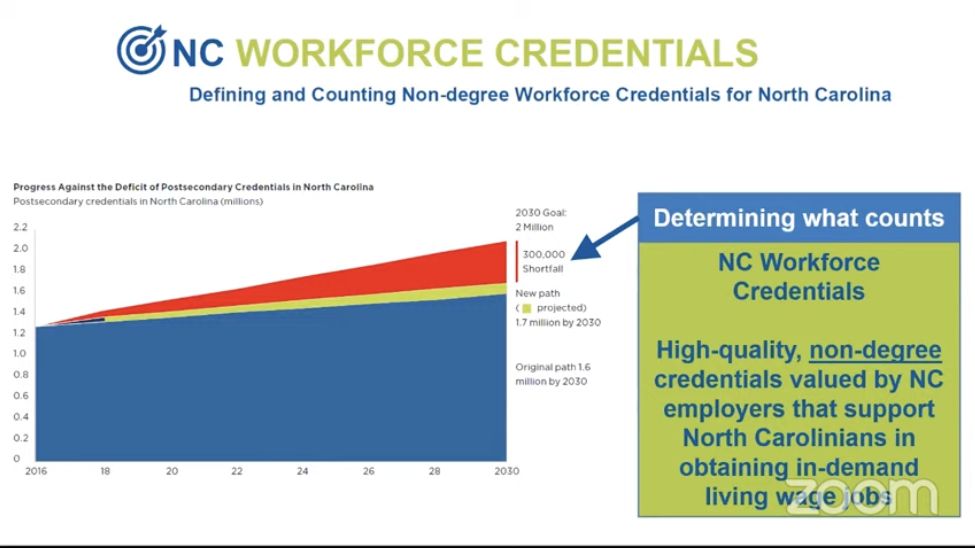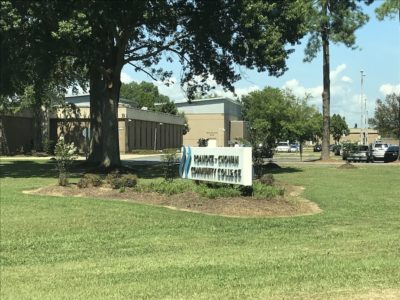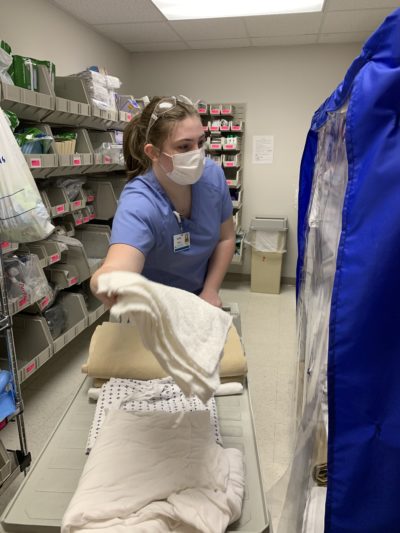It’s been a little over a year since North Carolina community colleges had to abruptly change their course delivery options – shifting many of their courses online. Despite the shift, “North Carolina community colleges have remained open since the pandemic began,” said Kandi Deitemeyer, president of Central Piedmont Community College. “And we are working on our plans to fully reopen,” she continued.
“What we know is that our students across the state want to be in community. They want to be in community on their campuses. The reality is, for many of our students, it’s a place for them to go where they know they are cared for and that they are supported. It’s a place where they get a lot of holistic wraparound services – whether that’s a food pantry, or just other supports outside the academic area that are meaningful for their lives.”
Kandi Deitemeyer, president of Central Piedmont Community College
The State Board of Community Colleges discussed the importance of reopening for in-person learning this fall at their monthly meeting on Friday, April 16.
“We have one mission and one goal, and that’s to serve the students of North Carolina,” said Thomas Stith, president of the North Carolina Community College System.
NC Workforce Credentials and GEER funding – solving the supply and demand problem
“Enrollment is down. And those declines are particularly sharp in two areas – Career and Technical Education (workforce education) and Adult Basic Skills,” said Patrick Crane, vice president of strategic initiatives for the system office.
Crane pointed to two recent surveys that shed some light on these declines.
In September 2020, Strada Center for Education and Consumer insights surveyed adults across the country and discovered that adults were more interested than ever in training opportunities. Their interest was strongest in short-term non-degree credentials – training that connected directly to their employability. Some of their biggest concerns were that they didn’t have enough information about their options.
More recently, a US Census survey found that 30% of North Carolina adults who planned to take college classes this year cancelled their plans, and half said it was because of income changes.
“Fifty-one percent cited income changes as their reason,” Crane said. “Above and beyond fear of COVID or the pandemic, it was changes in their family income.”
According to myFutureNC, North Carolina is headed for a 300,000 shortfall in the number of adults with high quality postsecondary credentials or degrees by 2030. State leaders are hoping a new initiative to identify non-degree credentials that lead to in-demand, high-skill, high-wage occupations will help.
In the fall of 2019, leaders from the North Carolina Community College System, the Department of Commerce, the NCWorks Commission, the Department of Public Instruction, myFutureNC, and the Governor’s office formed a working group that is now known as the NC Workforce Credentials Council. Since then, they have been working to identify these non-degree credentials and increase the number of people who earn them.


System leaders also hope that GEER scholarships will increase the number of adults earning these credentials and help with both short-term economic recovery and long-term success of the state’s attainment goal of 2 million by 2030. GEER (Governor’s Emergency Education Relief) funding is an allocation of $15 million in scholarships for workforce training.
GEER funding will be especially crucial, said senior vice president and chief academic officer Kim Gold, “since we’ve known for a long time that our students in workforce continuing education are not eligible for Pell funding.”
“The NC Workforce Credentials work as well as the $15 million in funding for scholarships … connects North Carolinians with credential pathways leading to good jobs, and it provides them with the money to be able to do it,” said Crane.
A call for community awareness surrounding mental health training
In January 2021, the Board approved the reallocation of up to $75,000 to support the credentialing of mental health first aid instructor trainers.
“Given the pandemic, we reallocated those with the recognition of the stress that many of our students, staff, faculty, and communities have faced during this pandemic,” said Gold.
The funds will provide training for one employee at each college to be certified as a National Council for Behavioral Health Mental Health First Aid trainer.
Now, a course is being created so that once those individuals are trained, they can also offer this content to their communities.
“Any kind of community stakeholder, business and industry partners, elementary and secondary education, or public safety agencies could all receive this training,” said Gold.
Board member William Holder asked, “With the relevance of this kind of training and all the incidents going on around the country, my hope is at a minimum that we as a Board and as a system could push this awareness to police departments across the state.”
Nate Humphrey, associate vice president for workforce continuing education, said all public safety personnel and law enforcement will have access to this training under a tuition waiver for public safety and law enforcement training needs.
Psychology and sociology articulation agreement approved
The Board approved a uniform articulation agreement between the North Carolina Independent Colleges and Universities’ and the North Carolina Community College System’s psychology and sociology programs.
The goal of this articulation agreement is to create a more seamless and rational transfer process for community college students interested in psychology or sociology degrees.
The North Carolina Community College System and the North Carolina Independent Colleges and Universities will have an official signing of this articulation agreement on April 21, and it will be effective spring 2021.
“Anytime we can make our transfer seamless for students, that’s always a good thing,” said Gold.
The next State Board meeting is scheduled for May 20-21, 2021.




